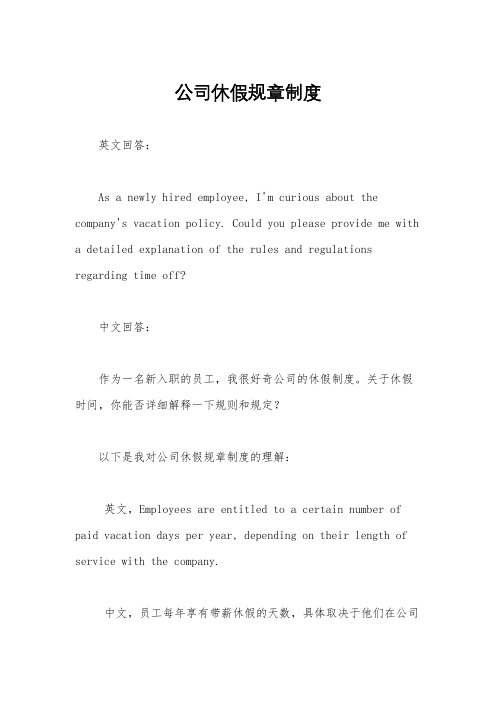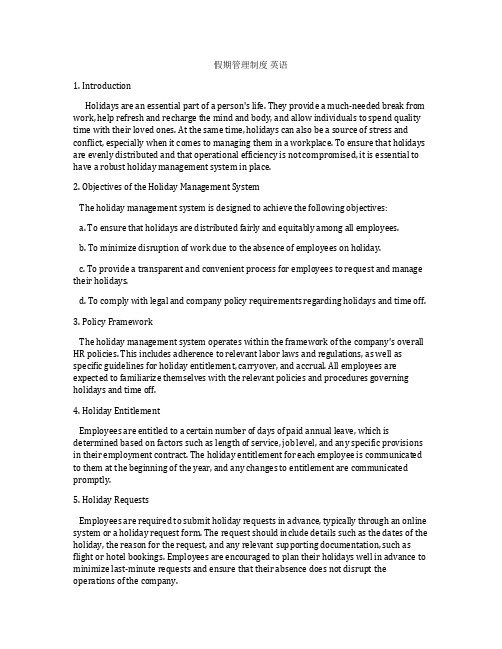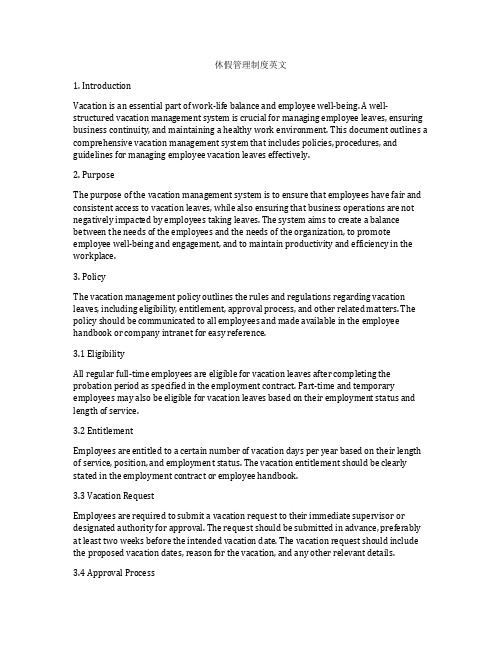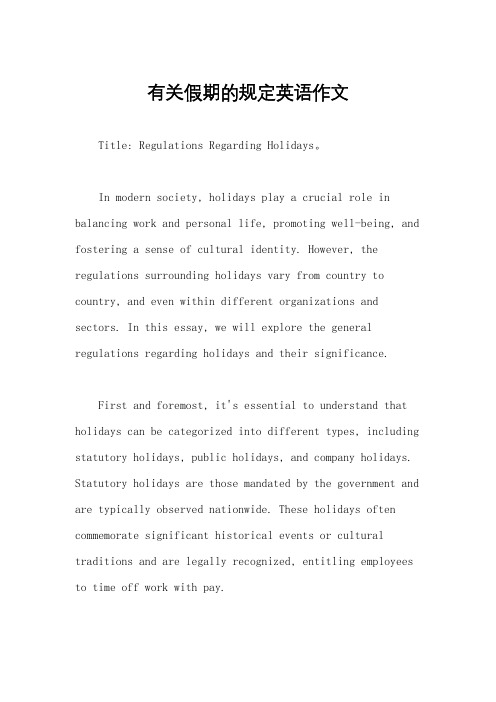休假管理中英文版
工作时间休假考勤管理规定中英文

为了完善和健全公司管理体系,确保公司进行有秩序的经营管理,特明确本制度,本制度适用于全体员工。
In order to improve and perfect the management system and ensure the orderly operation and management of the company, this system has been specifically defined and applicable to all employees.一、工时制度I.System of Working Hours公司根据员工的工作岗位、级别、工作内容、工作时间要求等因素,实行定时工时制和不定时工时制。
The company implements the regulated working hour system and the irregular working hour system according to the employee's job level, work content, work time requirements and other factors.1.定时工时制Regulated Working Hour Systema)工作时间定为每周40小时,每周工作五天,周六周日休息(遇节假日详见实时通知)。
There are 40 hours, 5 working days each week and two days forweekends (For other holidays, a real-time notice will be given).b)公司员工执行上下班钉钉考勤,指纹记录或做面部识别记录考勤制度。
The employees of the company shall follow the attendance system ofDing Talk, fingerprint or facial recognition records.c)工作时间Working Schedules公司实行定时工时制,上班时间不迟于10:00;下班时间不早于17:00,每天工作时间不低于8小时。
公司休假规章制度

公司休假规章制度英文回答:As a newly hired employee, I'm curious about the company's vacation policy. Could you please provide me with a detailed explanation of the rules and regulations regarding time off?中文回答:作为一名新入职的员工,我很好奇公司的休假制度。
关于休假时间,你能否详细解释一下规则和规定?以下是我对公司休假规章制度的理解:英文,Employees are entitled to a certain number of paid vacation days per year, depending on their length of service with the company.中文,员工每年享有带薪休假的天数,具体取决于他们在公司的服务年限。
英文,Vacation days can be used for any purpose, including personal travel, family obligations, or simply taking a break from work.中文,休假时间可用于任何用途,包括个人旅行、家庭义务或仅仅是为了休息一下。
英文,Employees must submit a vacation request form to their supervisor at least two weeks in advance, except in cases of emergency.中文,员工必须至少提前两周向他们的主管提交休假请求表,除非紧急情况。
英文,The supervisor will review the request and approve it if there are no conflicts with business needs.中文,主管将审查请求,并在不与业务需求冲突的情况下批准请求。
休假制度Leaveandvacation

目的Purpose将本公司有关请假与休假规定事项予以制度化、标准化;This document’s target is to institutionalize and standardize the company’s provisions about leaves and vacation.1. 适用范围Applicable scope本规定适用于公司全体在职员工的请假、休假管理;This provision applies to leaves and vacation management of all staff in-service.2. 职责Responsibilities3.1 人力资源部负责本办法的制定、修改、废止的起草工作;HR Dept. is responsible for drafting the provision’s formulation, modification and abolition;3.2 总经理(或其代理人)负责本办法的制定、修改、废止的批准工作;CEO (or his agent ) is responsible for approving the provision’s formulation, modification and abolition;3.3 人力资源部为本规定的管理部门;HR Dept. is the management department of this provision;3.5 除非公司另有规定,由财务部兼管人力资源部工作;Unless otherwise specified, finance dept. shall also bear job responsibility of HR dept..3. 管理规定Management provisions4.1 休假/请假类别Category of Vacation/Leaves休假/请假分为法定节假日、法定带薪休假、病假、工伤假、婚假、孕检假、产假、哺乳假及护理假、丧假、事假、总经理关怀假等几类;The vacation/leaves are classified as follows: statutory holidays, statutory paid vacation, statutory sick leaves, work related injury leaves, marriage leaves, pregnancy-test leaves, maternity Leaves, nursing Leaves, paternity Leaves, bereavement leaves, private affair leaves and caring day from CEO;4.2 各类休假管理;All kinds of vacation management4.2.1 法定节假日Statutory Holidays全体员工每年享受以下带薪法定休假日:staff enjoys the following statutory holidays:元旦New Year’s day 1天1 Day国际劳动节Labor Day1天1 Day春节Spring Festival 3天3 Days端午节Dragon-Boat Festival1天1 Day清明节Tomb-sweeping Day 1天1 Day国庆节National Day3天3 Days中秋节Mid-Autumn Festival 1天1 Day妇女节Women’s Day0.5天0.5 Day4.2.2带薪年假Annual Leaves4.2.2.1 员工每年可以享受的休假天数(N),依据员工的累积工作年限来计算。
假期管理制度 英语

假期管理制度英语1. IntroductionHolidays are an essential part of a person's life. They provide a much-needed break from work, help refresh and recharge the mind and body, and allow individuals to spend quality time with their loved ones. At the same time, holidays can also be a source of stress and conflict, especially when it comes to managing them in a workplace. To ensure that holidays are evenly distributed and that operational efficiency is not compromised, it is essential to have a robust holiday management system in place.2. Objectives of the Holiday Management SystemThe holiday management system is designed to achieve the following objectives:a. To ensure that holidays are distributed fairly and equitably among all employees.b. To minimize disruption of work due to the absence of employees on holiday.c. To provide a transparent and convenient process for employees to request and manage their holidays.d. To comply with legal and company policy requirements regarding holidays and time off.3. Policy FrameworkThe holiday management system operates within the framework of the company's overall HR policies. This includes adherence to relevant labor laws and regulations, as well as specific guidelines for holiday entitlement, carryover, and accrual. All employees are expected to familiarize themselves with the relevant policies and procedures governing holidays and time off.4. Holiday EntitlementEmployees are entitled to a certain number of days of paid annual leave, which is determined based on factors such as length of service, job level, and any specific provisions in their employment contract. The holiday entitlement for each employee is communicated to them at the beginning of the year, and any changes to entitlement are communicated promptly.5. Holiday RequestsEmployees are required to submit holiday requests in advance, typically through an online system or a holiday request form. The request should include details such as the dates of the holiday, the reason for the request, and any relevant supporting documentation, such as flight or hotel bookings. Employees are encouraged to plan their holidays well in advance to minimize last-minute requests and ensure that their absence does not disrupt the operations of the company.6. Approval ProcessHoliday requests are evaluated based on factors such as the employee's entitlement, the needs of the business, and the availability of alternative cover. Managers are responsible for reviewing and approving holiday requests, taking into account the overall impact on the team and the company. In cases where there is a conflict or overlapping requests, the HR department may be involved to help resolve the situation.7. Holiday Carryover and AccrualTo avoid a situation where employees are forced to take all their leave at once, the company may have a policy on carryover and accrual of holidays. This may allow employees to carry over a certain number of days into the next year or may allow them to accrue additional leave for future use. The specific policy on carryover and accrual should be clearly communicated to all employees to avoid misunderstandings.8. Holiday CalendarThe company may maintain a holiday calendar that shows the availability of employees on a given day. This helps managers to plan work schedules and distribute workloads accordingly. The holiday calendar may also include public holidays and other company-specific holidays to provide a comprehensive overview of leave availability.9. Holiday Blackout PeriodsDuring certain times of the year, such as peak business seasons, the company may impose holiday blackout periods when employees are not allowed to take leave. This is done to ensure that the business operates smoothly during critical periods and to avoid overburdening the remaining staff.10. Return from HolidayEmployees are expected to return to work on the specified date following their holiday, unless there are exceptional circumstances that prevent them from doing so. It is essential for employees to plan their return from holiday, taking into account factors such as jetlag, travel time, and any necessary preparations for their return to work.11. Documentation and Record-KeepingThe company maintains accurate records of holiday entitlement, requests, approvals, and carryover/acrual for each employee. This documentation is essential for compliance purposes, as well as for resolving any disputes or misunderstandings that may arise in the future.12. Anti-Discrimination and FairnessThe holiday management system is designed to be fair and non-discriminatory, ensuring that all employees have an equal opportunity to take holiday leave. Any instances ofdiscrimination or unfair treatment in holiday management are taken seriously and dealt with promptly.13. Monitoring and EvaluationThe holiday management system is subject to regular monitoring and evaluation to ensure its effectiveness and efficiency. This may involve collecting feedback from employees, reviewing holiday patterns and trends, and making adjustments to the system as necessary.14. ConclusionA well-designed holiday management system is essential for ensuring that holidays are managed effectively and fairly in the workplace. By adhering to the principles outlined in this policy, the company aims to create a positive and inclusive work environment where employees can enjoy the benefits of time off without compromising the needs of the business.。
休假年制度英语作文

休假年制度英语作文(中英文版){z}Title: The Vacation Year SystemIn many countries, the vacation year system is gaining popularity as a way to improve work-life balance and employee well-being.This system allows employees to take an extended period of time off work, typically a full year, to rest, recharge, and pursue personal interests or hobbies.The benefits of the vacation year system are numerous.Firstly, it promotes physical and mental health by reducing stress and burnout.Employees who take a year off can use this time to travel, spend time with family, or engage in physical activities, which can improve their overall well-being.Secondly, the vacation year system can lead to increased productivity and creativity when employees return to work.Time away from work can provide fresh perspectives and new ideas, which can benefit the company in the long run.Furthermore, the vacation year system can also have positive effects on the company"s culture and employee retention.When employees feel valued and supported in their personal endeavors, they are more likely to be loyal to the company and stay for the long term.This can lead to a more stable and experienced workforce, which is beneficial for the company"s success.However, there are also challenges associated with the vacation yearsystem.For example, it may be difficult for companies to manage the workload and cover for employees who are on leave.Additionally, there may be financial implications for both the employee and the company, as the employee may not be earning a salary during their time off, and the company may need to provide severance pay or benefits.Despite these challenges, the vacation year system is an important initiative that can lead to a more balanced and fulfilling work life for employees.It is important for companies to carefully consider the benefits and challenges of implementing this system and to develop a clear plan to manage the workload and ensure a smooth transition for employees who choose to take a year off.In conclusion, the vacation year system is a valuable tool for improving work-life balance and employee well-being.With careful planning and management, it can lead to increased productivity, creativity, and employee retention, ultimately benefiting both the employee and the company.。
休假管理制度英文

休假管理制度英文1. IntroductionVacation is an essential part of work-life balance and employee well-being. A well-structured vacation management system is crucial for managing employee leaves, ensuring business continuity, and maintaining a healthy work environment. This document outlines a comprehensive vacation management system that includes policies, procedures, and guidelines for managing employee vacation leaves effectively.2. PurposeThe purpose of the vacation management system is to ensure that employees have fair and consistent access to vacation leaves, while also ensuring that business operations are not negatively impacted by employees taking leaves. The system aims to create a balance between the needs of the employees and the needs of the organization, to promote employee well-being and engagement, and to maintain productivity and efficiency in the workplace.3. PolicyThe vacation management policy outlines the rules and regulations regarding vacation leaves, including eligibility, entitlement, approval process, and other related matters. The policy should be communicated to all employees and made available in the employee handbook or company intranet for easy reference.3.1 EligibilityAll regular full-time employees are eligible for vacation leaves after completing the probation period as specified in the employment contract. Part-time and temporary employees may also be eligible for vacation leaves based on their employment status and length of service.3.2 EntitlementEmployees are entitled to a certain number of vacation days per year based on their length of service, position, and employment status. The vacation entitlement should be clearly stated in the employment contract or employee handbook.3.3 Vacation RequestEmployees are required to submit a vacation request to their immediate supervisor or designated authority for approval. The request should be submitted in advance, preferably at least two weeks before the intended vacation date. The vacation request should include the proposed vacation dates, reason for the vacation, and any other relevant details.3.4 Approval ProcessVacation requests are subject to approval based on the operational needs of the department or organization. The immediate supervisor or designated authority will review the request and approve or deny it based on the availability of the employee, workload, and other relevant factors. Employees should receive timely notification of the approval or denial of their vacation requests.3.5 Vacation SchedulingVacation scheduling should be done in a fair and equitable manner, taking into consideration the needs and preferences of the employees as well as the operational needs of the organization. Conflicts in vacation scheduling should be resolved through mutual agreement or based on established guidelines.3.6 Carryover and PayoutUnused vacation days may be carried over to the next year within certain limits, as specified in the vacation management policy. Employees may also be entitled to a payout for unused vacation days upon termination of employment, based on the applicable labor laws and company policy.3.7 Vacation Blackout PeriodsThere may be certain periods during the year when vacation leaves are restricted due to high workload, seasonal demands, or other operational reasons. These blackout periods should be communicated to employees in advance and reflected in the vacation management policy.3.8 Vacation Management ReviewThe vacation management policy and procedures should be reviewed periodically to ensure that they are aligned with the changing needs of the organization and the employees. Any necessary updates or revisions should be made in consultation with the relevant stakeholders.4. ProceduresThe vacation management procedures provide a step-by-step guide for employees and managers on how to request, approve, track, and manage vacation leaves effectively. These procedures should be clearly communicated to all employees and documented for easy reference.4.1 Vacation Request ProcessEmployees should follow the designated process for submitting vacation requests, including the required forms, documentation, and approval channels. The process should be simple, transparent, and efficient to encourage employees to take vacations and to streamline the approval process.4.2 Vacation Approval ProcessManagers and designated authorities should follow a consistent and fair process for reviewing and approving vacation requests. This process should consider the operational needs of the department or organization while also respecting the needs and preferences of the employees.4.3 Vacation Tracking and ManagementThe HR department or designated personnel should maintain a comprehensive record of employee vacation leaves, including entitlement, usage, balances, carryovers, and payouts. This information should be accurate, up-to-date, and accessible to the relevant stakeholders.4.4 Communication and NotificationEmployees should receive timely communication and notification regarding the approval or denial of their vacation requests, as well as any updates or changes to the vacation management policy and procedures. Clear and effective communication is essential for managing employee expectations and promoting transparency.4.5 Vacation Coverage and HandoverManagers and employees should plan for adequate coverage and handover of responsibilities when employees are on vacation to ensure that business operations continue smoothly. This may involve reassigning tasks, delegating authority, or providing temporary support as needed.4.6 Conflict ResolutionIn cases of conflicts related to vacation scheduling or approval, employees and managers should work together to find a mutually acceptable solution. This may involve revising the vacation dates, adjusting work schedules, or seeking alternative arrangements.4.7 Monitoring and ComplianceThe HR department or designated personnel should monitor compliance with the vacation management policy and procedures, address any violations or concerns, and provide guidance and support to employees and managers as needed.5. GuidelinesThe vacation management guidelines provide additional information and best practices for employees and managers to effectively manage vacation leaves and promote a positive vacation culture in the organization. These guidelines may cover topics such as planning vacations, minimizing disruptions, and maximizing the benefits of time off.5.1 Planning VacationsEmployees are encouraged to plan their vacations in advance to ensure that they can take time off when it is most convenient for them and the organization. Planning ahead also allows for better coordination and scheduling of vacations among team members.5.2 Minimizing DisruptionsEmployees should take proactive steps to minimize disruptions to their work and the work of their colleagues when they are on vacation. This may include completing pending tasks, informing key stakeholders in advance, and setting up appropriate out-of-office messages and arrangements.5.3 Maximizing BenefitsEmployees are encouraged to make the most of their vacation time by disconnecting from work, engaging in activities that promote relaxation and rejuvenation, and spending quality time with family and friends. Taking regular vacations can lead to increased productivity, creativity, and overall well-being.5.4 Supporting ColleaguesEmployees should support their colleagues in taking vacations and provide necessary assistance and coverage when they are away. This may involve collaborating on workload distribution, sharing knowledge and resources, and offering to help with urgent matters.5.5 Returning from VacationEmployees are expected to return from their vacations refreshed and ready to resume work with a positive attitude. Managers and colleagues should be supportive and understanding during the transition back to work, allowing employees to ease back into their routine.6. ConclusionA well-designed vacation management system is essential for promoting employee well-being, maintaining productivity, and creating a positive work environment. By implementing clear policies, efficient procedures, and helpful guidelines, organizations can effectively manage employee vacation leaves while ensuring business continuity and employee satisfaction. Regular communication, monitoring, and review of the vacation management system are critical for its success and continuous improvement.。
有关假期的规定英语作文

有关假期的规定英语作文Title: Regulations Regarding Holidays。
In modern society, holidays play a crucial role in balancing work and personal life, promoting well-being, and fostering a sense of cultural identity. However, the regulations surrounding holidays vary from country to country, and even within different organizations and sectors. In this essay, we will explore the general regulations regarding holidays and their significance.First and foremost, it's essential to understand that holidays can be categorized into different types, including statutory holidays, public holidays, and company holidays. Statutory holidays are those mandated by the government and are typically observed nationwide. These holidays often commemorate significant historical events or cultural traditions and are legally recognized, entitling employees to time off work with pay.Public holidays, on the other hand, may vary depending on the region or locality. While some public holidays are observed nationwide, others may be specific to certain regions or communities. These holidays are usually declared by government authorities or relevant institutions to celebrate religious, cultural, or national events.Company holidays are determined by individual organizations and may include additional days off beyond statutory and public holidays. The allocation of company holidays often depends on company policies, industry norms, and collective bargaining agreements. Some companies offer extra days off to employees as a gesture of appreciation or to coincide with specific cultural or religious observances.In most countries, there are regulations in place to govern holidays and ensure fair treatment of employees. These regulations may include provisions regarding the minimum number of paid holidays, eligibility criteria, holiday pay rates, and procedures for requesting time off. Labor laws and employment contracts often outline these regulations to protect the rights of workers and maintainharmonious employer-employee relations.One of the primary purposes of holiday regulations isto promote work-life balance and prevent burnout among employees. By providing designated time off for rest, relaxation, and personal pursuits, employers contribute to the overall well-being and productivity of their workforce. Studies have shown that employees who have adequate timefor leisure and recreation are more satisfied, motivated, and resilient in the workplace.Moreover, holidays serve as occasions for social cohesion and cultural enrichment. They provideopportunities for families and communities to come together, celebrate shared values, and engage in meaningfulactivities. Whether it's gathering for a traditional meal, participating in festive events, or simply enjoying leisure time with loved ones, holidays foster a sense of belonging and solidarity among individuals.However, despite the numerous benefits of holidays,there are also challenges associated with theirimplementation and enforcement. For instance, some industries, such as healthcare, transportation, and hospitality, operate around the clock and cannot afford to shut down completely on holidays. In such cases, employers must develop strategies to ensure adequate staffing levels while still accommodating employees' need for time off.Additionally, disparities may exist in holiday entitlements among different sectors of the workforce. While white-collar professionals may enjoy generous holiday packages, blue-collar workers, temporary employees, and gig workers may have less access to paid time off. Addressing these disparities requires a concerted effort from policymakers, employers, and labor unions to promote equity and inclusivity in holiday provisions.In conclusion, holidays play a vital role in modern society, contributing to individual well-being, social cohesion, and cultural identity. Regulations governing holidays aim to strike a balance between the needs of employers and employees while upholding principles of fairness and equity. By recognizing the significance ofholidays and ensuring their effective implementation, societies can foster healthier, happier, and more productive communities.。
公司短期病假规定中英文

SHORT TERM SICK LEAVE美國公司短期病假中英文規定Ⅰ. GENERAL(原則)The Company’s Short Term Sick Leave policy provides a consistent basis for salary continuance during periods of temporary absence resulting from illness or injury.當員工因生病或身體受傷而需要臨時缺席休假不能夠上班時,公司的短期病假政策,提供在此期間一個給薪的準則。
Full-time employees who have completed three full month of continuous service are eligible.全職員工必須連續服務滿三個月才有資格適用這個政策。
No contribution is required other than the statutory amount stipulated by the concerned labor laws.公司只需依據勞基法所規定的條例給予他們所需要的補償,不需額外提撥。
Benefits depend upon length of service and the employee’s past attendance record.員工所能得到的補償是根據他們在公司的服務年資及該員工過去的出勤紀錄。
One day of paid sick leave for five-day workweek employees is allowed for each completed month of continuous service less any paid days of sick leave taken since employment.凡每週工作五天的員工,每工作服務滿一個月就有一天的有薪病假的權利,但有薪病假天數是可以累計的。
- 1、下载文档前请自行甄别文档内容的完整性,平台不提供额外的编辑、内容补充、找答案等附加服务。
- 2、"仅部分预览"的文档,不可在线预览部分如存在完整性等问题,可反馈申请退款(可完整预览的文档不适用该条件!)。
- 3、如文档侵犯您的权益,请联系客服反馈,我们会尽快为您处理(人工客服工作时间:9:00-18:30)。
1.0总则1.0General Principles1.1 目的为规范公司员工休假管理,维护公司正常的工作秩序和生产经营活动,根据国家或地方政府有关规定制定本规定。
1.1 PurposeTo standardize HDTD employee leave & holiday management for companies smooth Operations. This Policy has been formulated in accordance with relevant provisions from local and national government.1.2 适用范围此规定适用于与公司签订劳动合同的全体员工。
如有从借调过来的员工,其休假制度将根据与公司签订的借调协协议执行。
所有的借调员工的任何休假申请,必须得到其直线经理的批准。
1.2 Scope of ApplicationThis rule applies to all the HDTD Employees who have signed labor contract with HDTD. As for the Employee on load from Halliburton or SPT, they should perform their vacation according to the loan agreement they have signed with HDTD. For all seconded/loaned employees approval from reporting manager in HDTD is mandatory to avail any of the leaves.1.3 休假管理原则•各部门应充分做好员工休假的统筹安排,避免因员工休假对公司业务及生产经营活动产生不利影响。
•关注员工身心健康和生活质量,保障员工合理的休假权利•员工休假应全面履行休假手续,确保员工休假信息的准确、完整1.3 Leave Management Principles•All the departments should arrange the Vacation of their Employee in advance to avoid the negative influence for Company’s business andCompany’s normal production and operation•Company should pay attention to employee’s health and living quality, ensuring the right of Employees for reasonable Vacation application.•Employee should perform their Vacations on the condition of fulfilling the Vacation application process. The data of Employee Vacation must beaccurate and completed.2.0休假管理2.0Leave Management2.1 休假种类员工休假包括事假、病假、调休、婚假、产假/陪产假、丧假、年假、法定节假日、工伤假、外派境外员工回国例行休假、公司规定的其它休假等。
2.1 Leave TypeThe types of Employee Vacation included in this policy are: Personal Leave, Sick Leave, Overtime Compensation (Extra Day Off), Marriage Leave, Maternity/Paternity Leave, Funeral Leave, Annual Leave, Statutory Holidays, Working Injury Leave, the Regular Vacation of the Employees Working out of China and other Vacations in Company policy.2.2 请假及销假员工休假的,须进行请假及销假手续,具体规定如下:•员工请假应先办理请假申请手续,填写《请假申请单》(见附件一),经相关领导签字审批后,报人力资源部备案,方可休假。
•休假需要延长期限的,须另行提前请假。
•因紧急或特殊情况不能亲自办理请假手续的,应提前通过电话向其部门经理请假,并于返回公司当天将正式请假手续交至公司人力资源部。
•实际休假天数少于或超过请假天数的,须在返回公司当天到人力资源部做好登记手续,并销假。
2.2 Leave Application and Reporting Back after LeaveIf an employee wants to apply for leave, he/she must complete leave application in advance and report back after leave. Following are the details:•Employee should apply for his/her leave in advance, fill in the Leave Application Form ( Appendix 1), get the required approval from his/herline managers. Once approved by his line manager; this signed form mustbe returned to HR department.•If the Employee wants to extend his/her Vacation, he/she should apply for extension of Vacation in advance.•If the Employee could not complete the leave application process personally due to some emergency or special situation, he/she shouldinform his/her department manager via phone, and submit the leaveapplication documents to HR department when he/she comes back fromleave.•If the vacation days less than or more than the days Employee applied for, the Employee should notice HR in time when he/she comes back to work.2.3 请假审批管理员工请假审批管理规定如下:•公司员工请假,须经部门经理批准•各级领导根据实际业务需要,可要求下属员工推迟或中止休假到岗工作,工作任务结束后,员工可申请补休•未经审批擅自脱离工作岗位休假的将被认定为旷工,并按公司管理相关制度处罚。
2.3 Leave Approval ManagementThe rules of Leave Approval Management are as following:•All the employees of HDTD must get the approval from his department manager/line manager.•The department managers/line managers have the right to ask their subordinates to postpone or stop their Vacation due to any of the businesscritical reasons. Once the task has been completed, the Employee canapply for the rest days of his/her leave as compensation.•If an employee does not report to duty without leave approval from his/her manager, this behavior would be identified as non-reason absenteeismand would be liable for disciplinary action according to CompanyManagement Policy.3.0休假种类具体规定3.0The Details of different types of leave3.1 事假事假管理规定如下:•员工因有私事,必需亲自处理,需请事假,须事先向部门经理详述缘由并得到批准•全年累计事假不得超过15天。
•事假期间不享有工资。
•以自然年为单位,当年可申请的事假天数不能累计到下一年度使用。
当年未申请的事假天数下一年度自动作废。
3.1 Personal Leave:The rules of Personal Leave management are as following:•The absence from work due to private affairs would be identified as Personal Leave. Employee should apply for Personal Leave in advanceand get the approval from his/her department manager.•The total Personal Leave should not more than 15 working days per calendar year.•Company would not pay for Personal Leave.•Personal Leave cannot be carried forward to another calendar year.Company will strictly follow use it or lose it policy for personal leaves3.2 病假:•非工伤员工因病需要请假休息的,按病假处理。
